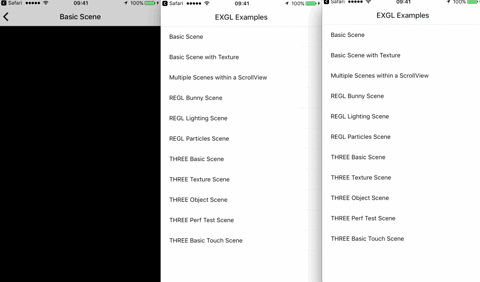Introduction
Guides
- Up and Running
- Development Mode
- Configuration with exp.json
- Viewing Logs
- Debugging
- Assets
- Preloading & Caching Assets
- Icons
- Using Custom Fonts
- Routing & Navigation
- Push Notifications
- Genymotion
- exp Command-Line Interface
- Building Standalone Apps
- How Exponent Works
- Upgrading Exponent
- Using ClojureScript
- Using Firebase
GLView
Exponent.GLView()
A View that acts as an OpenGL ES render target. On mounting, an OpenGL ES context is created. Its drawing buffer is presented as the contents of the View every frame.
Other than the regular View props for layout and touch handling, the following props are available:
onContextCreate
A function that will be called when the OpenGL ES context is created. The function is passed a single argument gl that acts as an interface to the underlying OpenGL ES context.
Examples
The @community/gl-test Exponent app demonstrates a number of example scenes. The image above is a low-quality capture, try the app on Exponent for the best-quality experience. The source code for these scenes is available here

The gl object
Once the component is mounted and the OpenGL ES context has been created, the gl object received through the onContextCreate prop becomes the interface to the OpenGL ES context, providing a WebGL-like API. It resembles a WebGLRenderingContext in the WebGL 1 spec. An additional method endFrameExp is present which notifies the context that the current frame is ready to be presented. This is similar to a ‘swap buffers’ API call in other OpenGL platforms.
As of SDK 11.0.0, not all WebGL functionality has been implemented. We plan to achieve more coverage of the API in upcoming SDK versions.
The following WebGLRenderContext methods are currently unimplemented:
-
Buffer
isBuffer
-
Texture
compressedTexImage2DcompressedTexSubImage2DcopyTexImage2DcopyTexSubImage2DgetTexParameterisTexturetexSubImage2D
-
Program an shaders
isProgramisShader
-
Uniform an attributes
getUniformgetVertexAttribgetVertexAttribOffset
-
Misc
finishgetSupportedExtensions
-
Framebuffer
framebufferRenderbuffergetFramebufferAttachmentParameterisFramebuffer
-
Renderbuffer
bindRenderbuffercreateRenderbufferdeleteRenderbuffergetRenderbufferParameterisRenderbufferrenderbufferStorage
readPixels is currently only supported on Android.
texImage2D only supports the 9-argument form. The last argument must either be an ArrayBuffer with the texture data as in the WebGL spec, an Exponent.Asset refering to an image to use as the source for the texture, or null.
For efficiency reasons the current implementations of the methods don’t perform type or bounds checking on their arguments. So, passing invalid arguments could cause a native crash. We plan to update the API to perform argument checking in upcoming SDK versions. Currently the priority for error checking is low since engines generally don’t rely on the OpenGL API to perform argument checking and, even otherwise, checks performed by the underlying OpenGL ES implementation are often sufficient.
© Copyright 2025, Exponent. Created using Gatsby.
